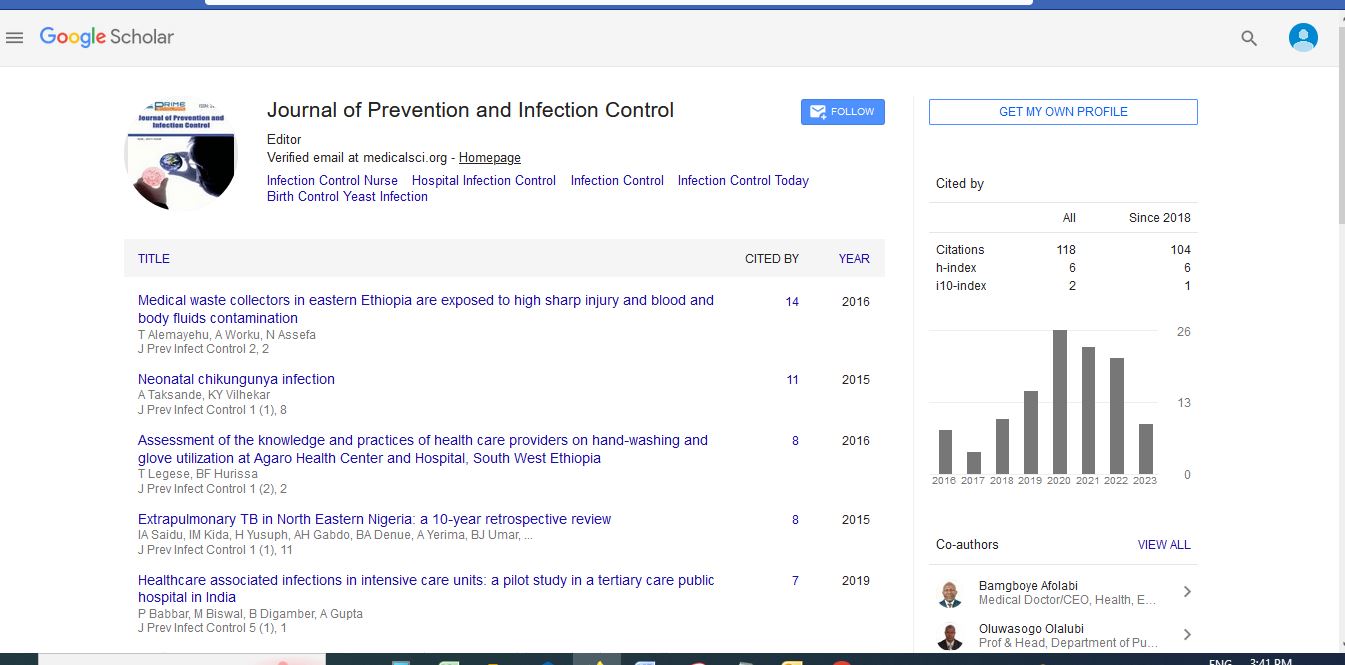Perspective - (2022) Volume 8, Issue 6
Clinical and Epidemiological Data of COVID-19 from Regensburg, Germany-A Retrospective Analysis of 1084 Consecutive Cases
Matthias Buczovsky*
Department of Medicine, University of California, USA
*Correspondence:
Matthias Buczovsky,
Department of Medicine, University of California,
USA,
Tel: 8345201679,
Email:
Received: 31-Oct-2022, Manuscript No. IPJPIC-22-15176;
Editor assigned: 02-Nov-2022, Pre QC No. IPJPIC-22-15176 (PQ);
Reviewed: 16-Nov-2022, QC No. IPJPIC-22-15176;
Revised: 21-Nov-2022, Manuscript No. IPJPIC-22-15176 (R);
Published:
28-Nov-2022, DOI: 10.36648/2471-9668-8.6.105
INTRODUCTION
Simple jungle fever implies when a person experiences side effects
but there is no evidence of serious contamination or rupture
of vital organs. It can develop into malaria. Symptoms can
resemble those of the flu and usually he lasts hours and recurs
daily. Nevertheless, some species of parasites can have longer
cycles or cause mixed symptoms. In areas where enteric disease
is exceptional, experts analyze influenza rather than jungle fever.
If a person has recently traveled to an area where this disease
occurs and has amplified these side effects, an encounter with
should be confirmed. With certain species of malaria parasites,
intestinal disease may disappear but then recur months or years
later. This is due to the fact that the parasite has a dormant phase
in which there is no movement of the disease. However, if it does
not recur, side effects may occur. The treatment a person should
receive after the most memorable episode is available and helps
prevent recurrence. Antimalarial drugs are about effective in preventing
jungle fever. If someone is taking these drugs, every effort
should be made to prevent them from biting while investing energy
in areas where the disease is tolerable. Want to venture into
areas where jungle fever is common. If you are thinking about it,
please inquire about enteric coated pills. Broadly speaking, individuals
should start taking their medication several days before
travel. You also need to be tested before taking some medicines,
and these tests may require an investment. Vaccines are now
available to prevent jungle fever, but they are of little interest to
researchers. Recommended for adolescents living in sub-Saharan
Africa in moderate-to-advanced gambling areas where falconium
disease, the malaria parasite, is common.
Description
To date, health professionals have prescribed more than million doses, with an adequate safety profile. Vaccination saves lives,
but it is not definitive. People can develop intestinal disease if
they are not bitten by infected mosquitoes. To cause disease in
an individual, the beetle must carry a parasite known as Plasmodium.
There are many species of this parasite, but only 5 of her
species can cause Jungle fever in humans. In addition, the bite
of a female Anopheles mosquito can cause intestinal disease in
humans. When a mosquito bites a person, the parasite enters
the blood. It moves to the liver and begins to increase. The liver
sends new jungle fever parasites back into the circulation, where
they cause platelet contamination of red blood cells and continue
to multiply. Some Jungle Fever parasites remain in the liver
and only circulate at different times, causing relapses. As the parasite
multiplies, side effects usually begin days after exposure,
depending on the type of malaria parasite. If you develop the disease
after taking antimalarial drugs, it may take weeks or months
for symptoms to appear. A healthy mosquito can also become
parasite-infected and restart the cycle when it benefits from the
blood it contains. Early detection is important for recovery from
intestinal disease. Infection can also occur after taking antimalarial
drugs.
Conclusion
In this case, side effects can occur up to a year after infection.
Anyone with side effects that may indicate jungle fever should
see a professional as soon as possible. If you have been in an area
with a history of jungle fever in the last months, seek appropriate
medical services. Must be reported to your doctor will obtain
information about side effects and travel history. Assuming they
suspect jungle fever, they arrange some blood tests.
Citation: Buczovsky M (2022) Clinical and Epidemiological Data of COVID-19 from Regensburg, Germany-A Retrospective Analysis of 1084 Consecutive Cases. J Prevent Infect Control. 8:105.
Copyright: © 2022 Buczovsky M. This is an open-access article distributed under the terms of the Creative Commons Attribution License, which permits unrestricted use, distribution, and reproduction in any medium, provided the original author and source are credited.

